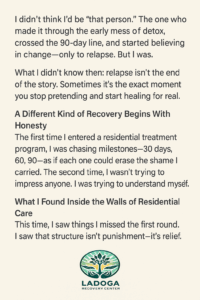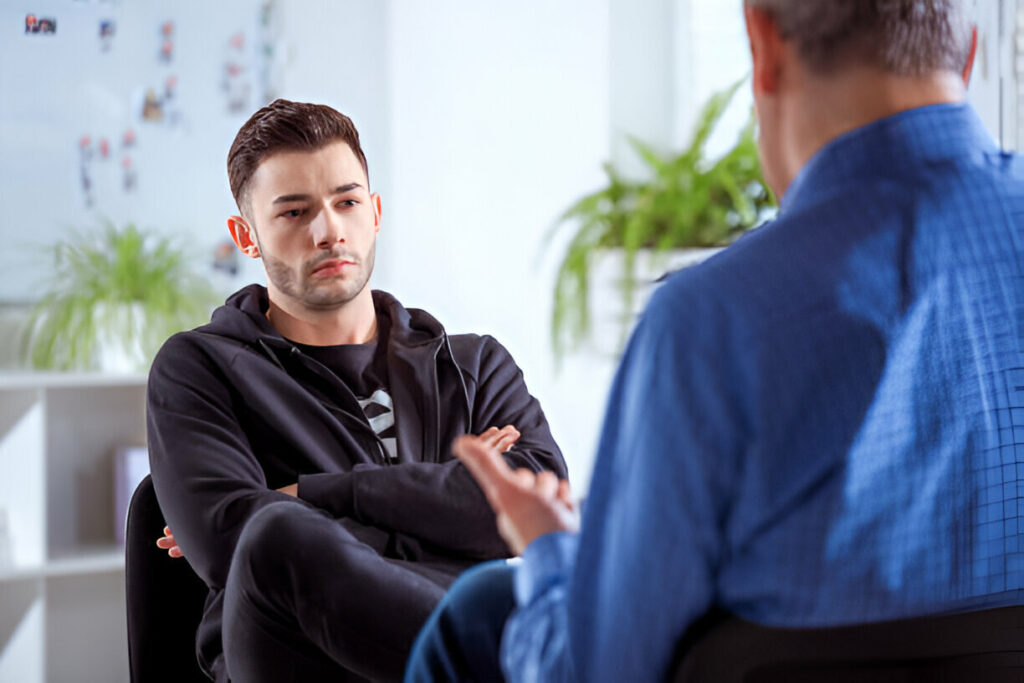I didn’t think I’d be “that person.”
The one who made it through the early mess of detox, crossed the 90-day line, and started believing in change—only to relapse. But I was. And for a long time, all I could hear in my head was: “You had your chance. You blew it.”
What I didn’t know then: relapse isn’t the end of the story. Sometimes it’s the exact moment you stop pretending and start healing for real.
It Didn’t Start With a Slip—It Started With Silence
I didn’t wake up one day and choose to use. It was quieter than that. Slower.
It started when I skipped one meeting because I “had a long day.” Then two. Then I stopped calling people who might ask how I really was. My daily practices—walking, journaling, pausing to check in—got replaced by overworking and isolation. I was still sober. But I wasn’t living in recovery.
By the time I used again, it didn’t feel like a sudden fall. It felt like gravity.
That moment—alone, ashamed, and terrified of how easily I could hide it—was when I knew I needed help. Not just a meeting. Not just a week of white-knuckling. I needed real support again.
The Second Call Was Harder Than the First
Reaching out after relapse felt like swallowing glass. I wasn’t a newcomer anymore. I knew better. I felt like I should have had it figured out by now.
But when I called Ladoga Recovery Center, the person who answered didn’t sound shocked or disappointed. They sounded calm. Familiar.
I braced for judgment. Instead, I got this:
“You’re not the first person to come back. You won’t be the last. Let’s talk about what you need now.”
That moment changed everything. It gave me permission to be human again.
A Different Kind of Recovery Begins With Honesty
The first time I entered a residential treatment program, I was trying to prove something. To my family. To myself. Maybe even to my past.
I was chasing milestones—30 days, 60, 90—as if each one could erase the shame I carried.
The second time, I wasn’t trying to impress anyone. I was trying to understand myself.
Why I used. What I was running from. What “recovery” meant for someone like me—someone who wanted to do better but still carried pain I didn’t know how to name.
At Ladoga, I was finally able to slow down and go deeper. Instead of just managing symptoms, I began exploring patterns. Not just the “what” but the “why.” It wasn’t about starting over—it was about starting deeper.
What I Found Inside the Walls of Residential Care
This time, I saw things I missed the first round.
I saw that structure isn’t punishment—it’s relief. Waking up in a place where the rhythm of your day is built for healing is its own kind of medicine.
Group therapy felt safer. Because this time, I wasn’t pretending to be the “success story.” I was real. Raw. Relieved to not have to perform.
The clinicians at Ladoga weren’t just kind—they were experienced. They saw through the walls I didn’t even know I had built. They helped me see my relapse not as failure, but as information. What broke down? Where did I get lonely, or rigid, or afraid?
These weren’t easy questions. But they were the ones I actually needed.
What Changed in Me the Second Time Around
I didn’t feel heroic this time. I felt tired. But also… honest.
And that honesty let me rebuild from a place that was steadier and more grounded than before. Not because I had all the answers, but because I stopped pretending I did.
One of the counselors said something I’ll never forget:
“The only thing stronger than relapse is coming back from it.”
That line stuck with me. Because it’s true. Anyone can fall. But choosing to rise—again—takes something most people don’t even know they have.

For the Alumni Who Think They’re Not Allowed Back
Let me say this clearly: You are not the exception.
You didn’t mess up too badly. You didn’t waste your chance. You are not “off the list” of people worthy of recovery just because you used again.
Relapse is part of many people’s stories. Not because they’re weak—but because real healing is rarely a straight line.
If you’re considering returning to a residential treatment program, I want you to know something:
There is no shame in needing more time. More support. Another shot.
There is only courage in saying, “I’m still willing to try.”
FAQ: Returning to a Residential Treatment Program After Relapse
Is it normal to relapse after 90+ days of sobriety?
Yes. While not inevitable, relapse is a common part of recovery. Many people relapse after 90 days due to emotional, social, or mental health triggers that weren’t fully addressed the first time.
Will I be judged for coming back to treatment?
Absolutely not. At centers like Ladoga, relapse is understood—not punished. Many staff members and peers have relapsed themselves. Compassion, not shame, is the foundation of recovery support.
How is the second time in treatment different?
Often, you’re more emotionally ready. You’ve been through the motions once—you know what to expect. That familiarity allows deeper work and greater honesty. Many people find their second stay to be more transformative.
Is residential treatment still the right level of care after relapse?
It depends. For some, residential treatment provides the safe structure and intensity they need to stabilize again. Others may benefit from an intensive outpatient program (IOP) or partial hospitalization program (PHP). The right fit depends on your symptoms, risks, and needs.
What makes Ladoga Recovery Center’s residential program unique?
Ladoga offers trauma-informed care, licensed clinical staff, and a warm, nonjudgmental community. Whether it’s your first time or fifth, their focus is always on whole-person healing—not perfection.
One Final Thought
If you’ve relapsed, you’re not starting from scratch.
You’re starting from experience.
And going back to a residential treatment program doesn’t erase your progress—it reclaims it.
You are still worthy of care. Still worthy of hope. Still allowed to try again.
And this time, you might find something you missed before:
Not just sobriety. But peace.
Ready to Try Again—With More Support?
Call (888) 628-6202 or visit Contact Us to take your next step in recovery. You don’t have to do this alone.

